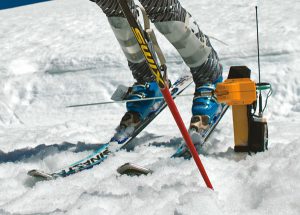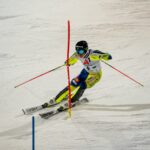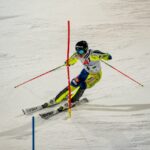After what was a long and demanding winter, the 2023-24 race season is now over. You’ve had some down time to catch up on school and get some much-needed rest and recovery, both physically and mentally. You may also be already looking toward next winter. But before you file the 2023-24 race season away, you want to act on a famous saying, “Those who do not learn from history are bound to repeat it.” In other words, if you don’t reflect back on last season, you may miss out on some important lessons that you can use for next season to continue to progress toward your ski racing goals.
Evaluate This Past Season
The first thing you want to do is to look back on the recently completed race season and evaluate how you did. Here are 8 essential questions to ask yourself (and your coaches):
- Did you achieve your goals this past winter? If so, why? If not, why not?
- What are your goals for the coming race season?
- What strengths do you bring forward from this past season that will propel into next season?
- What weaknesses have you identified that you need to improve on?
- What has worked for you that you absolutely want to keep doing?
- What hasn’t worked that you want to discard?
- What can you add to your training (physical, technical/tactical, mental) that has been missing?
- Finally, and specific to my area of expertise, what mental areas do you need to work on to get to the next level?
With these questions answered, you can, in collaboration with your coaches, decide what in your training worked and what did not. You can then use this information to create an off-season training program to build on your strengths and alleviate your weaknesses, so you will ski that much faster next season.
It’s About Preparation
Physical training. How you ski next season depends on what you do this spring, summer, and fall. The physical-conditioning gains you make and the technical, tactical, and mental skills you develop in the off-season will determine how much you improve and whether you reach your competitive goals next winter. There are three areas in which you must focus to maximize your preparation.
First, Commit to an intensive physical conditioning program. Ski racing has become a sport of “beef,” meaning you need muscle, strength, and power (plus, of course, agility and mobility). The only way to develop these areas is with an organized fitness program that may involve weight training, plyometrics, speed work, and stretching.
On-snow training. Second, most highly committed ski racers spend at least part of the summer and fall on snow. Summer and fall skiing is essential for your technical and tactical development because you’re able to focus exclusively on improvements in your skiing fundamentals without the pressures of getting ready for races. It also enables you to test and adapt to new equipment (though my motto is: “If it ain’t broke, don’t fix it,” meaning if your equipment works for you, don’t mess with it. Testing distracts you from training and can cause you to question which equipment is best for you).
Mental training. Finally, and just as importantly, the off-season is the best time to engage in mental training. Just like physical conditioning and technical skills, mental aspects of ski racing (e.g., confidence, intensity, and focus) take time and effort to develop. An organized program of mental training can have huge benefits when you enter the new race season.
Getting Going
Getting going for next season starts with that first step of deciding how important ski racing is to you. Here are some questions to ask yourself:
- How big are your ski racing goals for next season?
- How hard are your competitors going to be working in the off-season?
- How badly do you want it?!?!
The key to achieving your goals next winter is to start now! Talk is cheap. It’s easy to say you want to be a great ski racer; it’s an entirely different thing to actually do the work necessary. If your goals are at all high, the only chance you will have is to commit to intensive off-season physical, on-snow, and mental training programs. Your goal when you get in the starting gate of your first race next season is to be able to say: “I’m as prepared as I can be to ski my fastest.” And, with all of that hard work in the off-season that you “deposited in the bank,” the chances are you will be successful and reach your goals.







